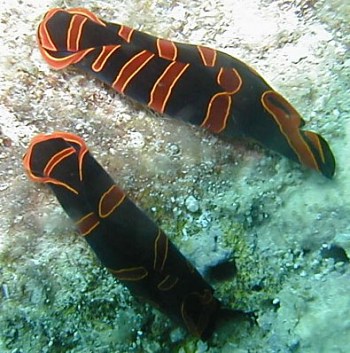
Philinopsis sp. 1
Order: CEPHALASPIDEA
Superfamily: PHILINOIDEA
Family: Aglajidae
PHOTO
Ishigaki-Island, Okinawa, Japan. July, 2000. Depth:13m. Lengths: 50mm, 40mm. Photo: Rie Nakano
See Rie Nakano's message below.
Authorship detailsRudman, W.B., 2001 (January 16) Philinopsis sp. 1 [In] Sea Slug Forum. Australian Museum, Sydney. Available from http://www.seaslugforum.net/find/philinsp1
Related messages
Re: New Philinopsis from Japan
December 18, 2006
From: Michael Henke

Concerning message #3547:
Dear Bill
Maybe these new pictures of Philinopsis sp 1 are interesting for you.
Locality: Tanjung Tarabitan, 8 m, Nord Sulawesi, Indo Pacific, 11 November 2006, sand. Length: 15 mm. Photographer: Michael Henke.
Thanks for the identification of Bornella anguilla an the explanation for the name
Best wishes,
Michael
henke@seddoc.de


Thanks Mike,
Nice to get another record of this species
Best wishes,
Bill Rudman
Re: Philinopsis sp. 1 from Sumbawa, Indonesia
August 24, 2006
From: Mickey Rosenau
Concerning message #17430:
In reading the postings, is it possible that Philinopsis sp.1 is migrating south?
July 2000 seen at Okinawa
January 2002 seen at Okinawa
September 2003 seen at Lembeh Strait, Sulawesi
August 2006 seen at Sangeang Island, Sumbawa
Mickey Rosenau
mrosenau@houston.rr.com
Rosenau, M., 2006 (Aug 24) Re: Philinopsis sp. 1 from Sumbawa, Indonesia. [Message in] Sea Slug Forum. Australian Museum, Sydney. Available from http://www.seaslugforum.net/find/17526Dear Mickey,
We know so little about many of these animals and their normal distributions that it's not possible to make the assumption that this species is a recent arrival in Indonesia. I would suspect this species is widespread throughout the Malayo-Indonesian Archipelago and the central Pacific. At present we are recording the distribution of photographers as much as anything. I am afraid that we wont be able to make sensible judgements on whether 'new locality data' really represents a recent change in an animal's geographic distribution until we know a lot more about existing distributions.
Best wishes,
Bill Rudman
Philinopsis sp. 1 from Sumbawa, Indonesia
August 16, 2006
From: Stefania Pagani

Would like to add some information on Philinopsis sp 1. Found one in Sangeang, Indonesia. .
Locality: Sangeang Island West coast, 8 m, Sumbawa, Indonesia, South China Sea, 8 August 2006, Corla garden slope.. Length: 3 cm. Photographer: Mickey Rosenau.
Stefania Pagani
Italy
sissiemarco@yahoo.it
Stefania Pagani, 2006 (Aug 16) Philinopsis sp. 1 from Sumbawa, Indonesia. [Message in] Sea Slug Forum. Australian Museum, Sydney. Available from http://www.seaslugforum.net/find/17430Dear Stefania,
Thanks for another record of this strangely coloured animal.
Best wishes,
Bill Rudman
Philinopsis sp. 1 from Sulawesi
September 24, 2003
From: Paul Whitehead

Dear Dr. Rudman,
This was spotted on September 12th at Lembeh Straits [northern Sulawesi, Indonesia] in 8m meters of water on tiered rocks with light coral and sponge cover. I have not been able to identify it and was hoping you could help?
Length is approx 6 cm.
Thanks
Paul
Whitehead@damnam.org
Whitehead, P., 2003 (Sep 24) Philinopsis sp. 1 from Sulawesi. [Message in] Sea Slug Forum. Australian Museum, Sydney. Available from http://www.seaslugforum.net/find/11024Dear Paul,
This is an unnamed species of which I have on the Forum as Philinopsis sp. 1. The previous records on the Forum are from Okinawa, so this find of yours certainly increases its known distribution.
Best wishes
Bill Rudman
Is this a Chelidonura punctata?
January 24, 2002
From: Hitoshi Ono

Hello,
Last week I went to Yonaguni Island located far western side of Yeyama Islands in Okinawa, Japan. Yonaguni Island is about 110km only from Taiwan as well.
My friend found a animal and show me while fun diving in this island. Is this a Chelidonura punctata? I'll be happy if this mail help your study a little.
data: 13 Jan 2002 water temp 23centigrade depth 21m on the rock, length 12mm
Best wishes,
Hitoshi Ono.
hal9001@green.ocn.ne.jp
Ono, H., 2002 (Jan 24) Is this a Chelidonura punctata?. [Message in] Sea Slug Forum. Australian Museum, Sydney. Available from http://www.seaslugforum.net/find/6081Dear Hitoshi,
This is a very interesting find. I have seen a photo of this animal before but can't remember where. It is probably a species of Chelidonura or perhaps Philinopsis but I don't think it has a name. If you have any photos showing the animal from a different angle they would be very welcome.
Best wishes,
Bill Rudman
Re: Is this a Chelidonura punctata?
January 24, 2002
From: Erwin Köhler
Dear Bill,
There are shots of this one already on the Forum. See Rie Nakano's message
Cheers Erwin
Erwin@medslugs.de
Köhler, E., 2002 (Jan 24) Re: Is this a Chelidonura punctata?. [Message in] Sea Slug Forum. Australian Museum, Sydney. Available from http://www.seaslugforum.net/find/6087Dear Erwin,
How embarassing! I was sure I had seen this animal and spent an hour or two searching for it in books and other websites. Thanks for finding it for me
Cheers,
Bill Rudman
New Philinopsis from Japan
January 18, 2001
From: Rie Nakano


Dear Bill,
I found this opisthobranch at Ishigaki-Island, Okinawa, Japan. July, 2000.
Depth:13m
Lengths: 50mm, 40mm
These animals crawled at very high speed on the top of the overhang. When I touched one, it put out purple ink like a sea hare. Could you tell me what kind of opisthobranch is this?
Sincerely,
Rie
rie@street.ne.jp
Nakano, R., 2001 (Jan 18) New Philinopsis from Japan. [Message in] Sea Slug Forum. Australian Museum, Sydney. Available from http://www.seaslugforum.net/find/3547Dear Rie,
I am pretty sure that this is a new species of Philinopsis (Family Aglajidae). Looking at the shape of the head I would guess that it has a long muscular pharynx like Philinopsis gardineri. The only other species of Philinopsis with a colour pattern of transverse lines is Philinopsis lineolata.
The purple ink you describe is unusual, as most aglajids produce a yellow ink, when they are disturbed, from a gland which opens into or near the anus. As you mention, Sea Hares are the only sea slugs I know that produce a purple ink.
This is a very interesting, and beautiful, new find
Best wishes,
Bill Rudman
